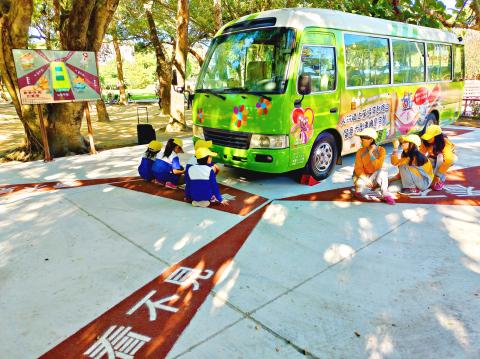A traffic safety park for children opened yesterday at the Youth Park in Taipei’s Wanhua District (萬華) to teach children about traffic safety issues.
Deputy Minister of Transportation and Communications Chi Wen-chung (祁文中) and Taipei Department of Transportation Director Chen Hsueh-tai (陳學台) said the establishment of the park is an important step toward preventing traffic-related deaths and injuries among children.
Aimed at children aged six to 12, the park employs a series of games focused on safety issues, the ministry said.

Photo: CNA
Teachers can guide students in playing the games, which are designed to raise awareness of personal safety around roadways and motor vehicles, it said.
The park is divided into seven learning zones: road signs and crossings — for which there are two zones each, safe waiting practices, traffic blind spots, and alleys and other narrow roadways.
It aims to teach children safe ways to cross the road, such as using crosswalks, pushing buttons for signals where they exist, and wearing bright or reflective clothing or accessories, the ministry said, adding that it would review the park’s teaching materials to determine their effectiveness.
About 60 percent of traffic accidents occur at crossings, and among those involving children 12 years old or younger, about 14 percent were due to a motor vehicle striking and killing the child, the ministry said.
The ministry plans to introduce measures between next year and 2022 to improve traffic safety, it said.
These include installing more button-activated crossing signals near schools and distributing short films on traffic education to elementary schools, alongside a proposal requiring schools to show a minimum of four hours of safety videos in class per academic year, it said.
Aside from referencing practices in Japan, Singapore and Hong Kong, ministry representatives spoke with schools in Taipei, Kaohsiung, Tainan and Miaoli to develop ideas for traffic safety parks, it said.
One park opened next to Kaohsiung’s National Science and Technology Museum, which held 236 sessions during its trial run from Sept. 1 to Nov. 15, it said.

Alain Robert, known as the "French Spider-Man," praised Alex Honnold as exceptionally well-prepared after the US climber completed a free solo ascent of Taipei 101 yesterday. Robert said Honnold's ascent of the 508m-tall skyscraper in just more than one-and-a-half hours without using safety ropes or equipment was a remarkable achievement. "This is my life," he said in an interview conducted in French, adding that he liked the feeling of being "on the edge of danger." The 63-year-old Frenchman climbed Taipei 101 using ropes in December 2004, taking about four hours to reach the top. On a one-to-10 scale of difficulty, Robert said Taipei 101

Nipah virus infection is to be officially listed as a category 5 notifiable infectious disease in Taiwan in March, while clinical treatment guidelines are being formulated, the Centers for Disease Control (CDC) said yesterday. With Nipah infections being reported in other countries and considering its relatively high fatality rate, the centers on Jan. 16 announced that it would be listed as a notifiable infectious disease to bolster the nation’s systematic early warning system and increase public awareness, the CDC said. Bangladesh reported four fatal cases last year in separate districts, with three linked to raw date palm sap consumption, CDC Epidemic Intelligence

US climber Alex Honnold left Taiwan this morning a day after completing a free-solo ascent of Taipei 101, a feat that drew cheers from onlookers and gained widespread international attention. Honnold yesterday scaled the 101-story skyscraper without a rope or safety harness. The climb — the highest urban free-solo ascent ever attempted — took just more than 90 minutes and was streamed live on Netflix. It was covered by major international news outlets including CNN, the New York Times, the Guardian and the Wall Street Journal. As Honnold prepared to leave Taiwan today, he attracted a crowd when he and his wife, Sanni,

Taiwanese and US defense groups are collaborating to introduce deployable, semi-autonomous manufacturing systems for drones and components in a boost to the nation’s supply chain resilience. Taiwan’s G-Tech Optroelectronics Corp subsidiary GTOC and the US’ Aerkomm Inc on Friday announced an agreement with fellow US-based Firestorm Lab to adopt the latter’s xCell, a technology featuring 3D printers fitted in 6.1m container units. The systems enable aerial platforms and parts to be produced in high volumes from dispersed nodes capable of rapid redeployment, to minimize the risk of enemy strikes and to meet field requirements, they said. Firestorm chief technology officer Ian Muceus said